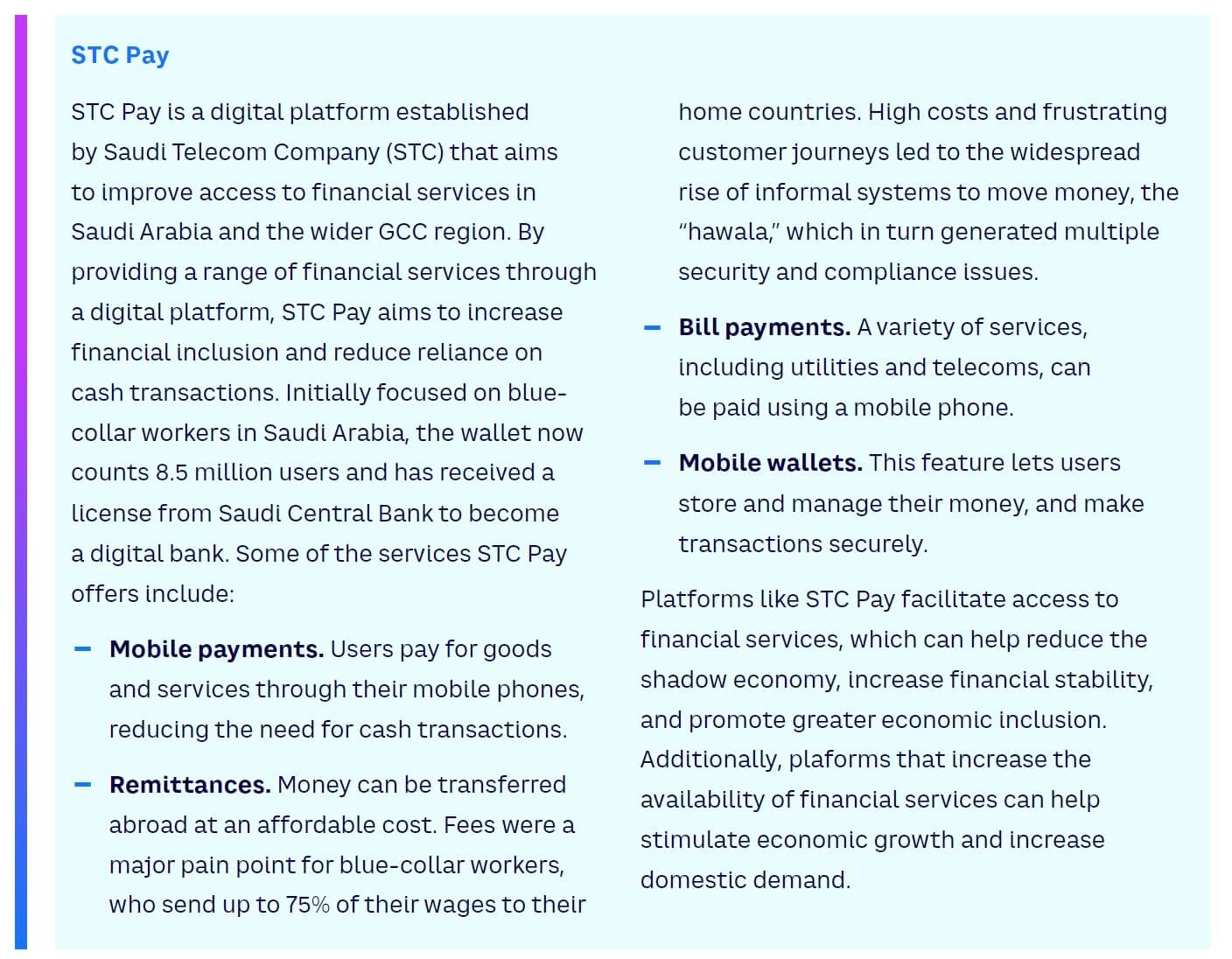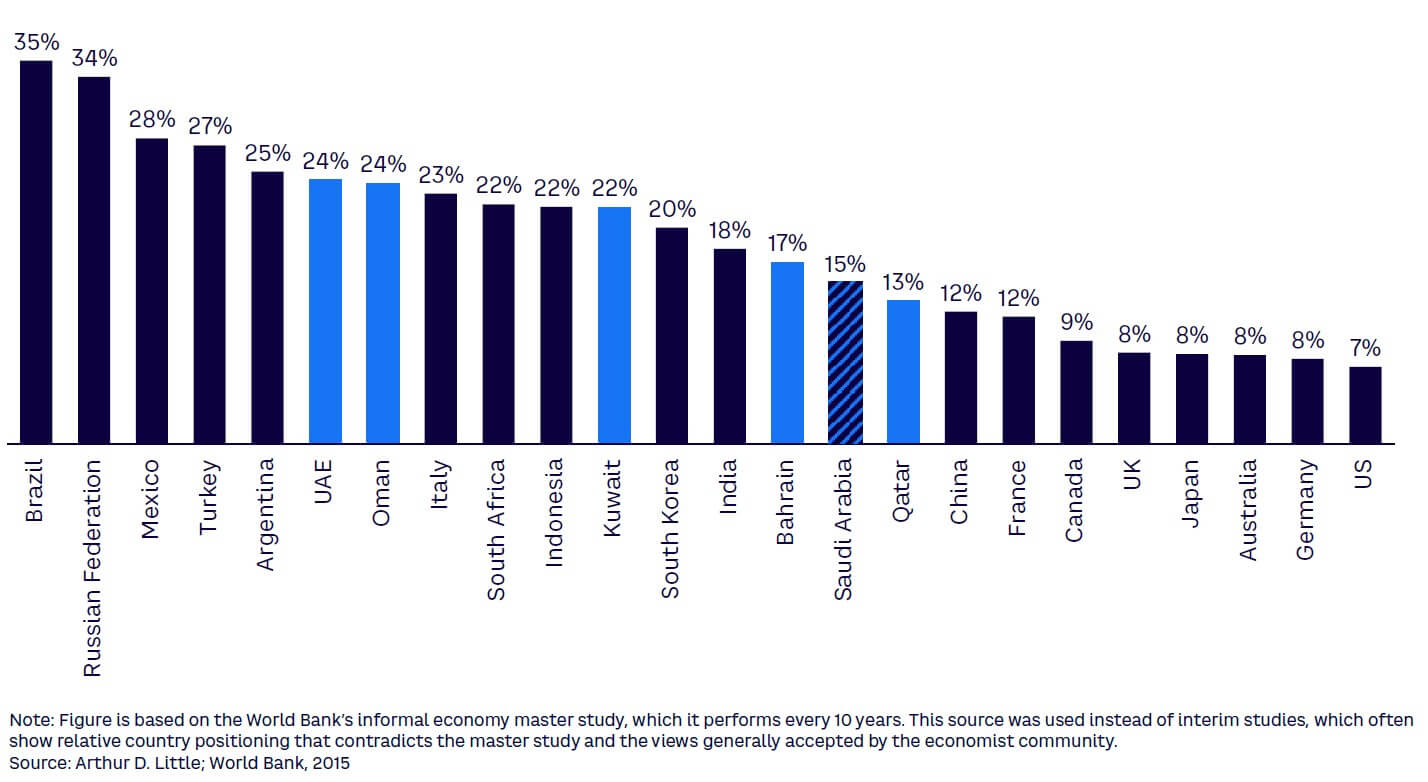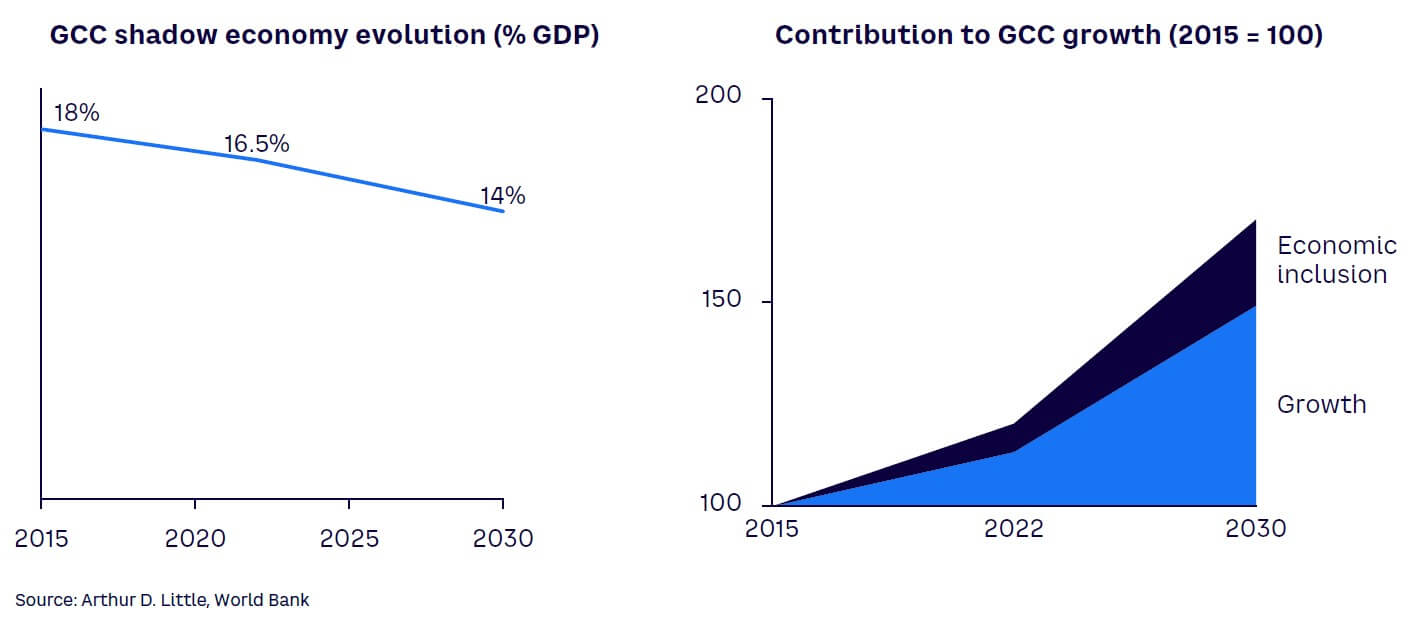
Gulf Cooperation Council (GCC) countries enjoy a remarkably small shadow economy. Their informal businesses account for 18% of GDP, below the world average (~28%), and close to Organisation for Economic Co-operation and Development (OECD) countries (~15%). However, bringing shadow businesses into the formal economy is a priority. This Viewpoint shares recent initiatives and explores options for shrinking the shadow economy and expanding small and medium-sized enterprises (SMEs) by increasing economic and financial inclusion.
ECONOMIC & FINANCIAL INCLUSION: THE KEY TO GCC GROWTH
Creating an economically and financially inclusive climate is key to future growth for countries in the GCC region. There are multiple reasons to prioritize inclusion:
-
Boost economic growth. By enlarging the scope of activities included in the formal economy to include more businesses performing in a transparent manner, GCC countries will benefit from additional sources of income. The region can also stimulate economic progress and increase domestic demand by expanding financial services for underbanked and unbanked populations.
-
Improve financial stability. Inclusion may reduce dependence on informal financial systems (e.g., those provided by non-licensed intermediaries), which can lead to greater stability in the financial sector. Economic actors who gain better access to formal financial services will enjoy stronger and more sustainable growth of their activity.
-
Promote social inclusion. Providing low-income populations with access to financial services can help alleviate poverty by enabling people to save and invest and obtain credit to start or grow businesses (as an example, see sidebar “STC Pay”). Economic inclusion can bring about social inclusion by introducing marginalized groups to the financial services they need to participate fully in the economy.
-
Support sustainable development. By increasing the availability of financial services, the GCC can further sustainable development goals, such as reducing overall inequality and furthering gender equality.
Financial and economic inclusion is an important undertaking for countries in the GCC region, as more inclusiveness can bolster long-term economic prospects and create a more equitable and stable society for all.

POTENTIAL IN THE INFORMAL ECONOMY
The GCC is spearheading the Middle East and North Africa (MENA) region’s fight against the shadow, or informal, economy by introducing policies and ideas to motivate shadow businesses to participate in the formal economy. Figure 1 shows the estimated informal economy of countries in the GCC and others based on GDP.

Some of the measures the GCC is taking include:
-
Improving tax enforcement — taking steps to increase tax enforcement and compliance, which includes implementing more robust tax laws and strengthening the capabilities of tax authorities. Helped by a historically low tax environment, GCC countries are evaluating international examples in order to refine the taxpayer experience (the largest cause of citizens and companies bailing out of the tax process, after the tax burden itself) and to create balanced value propositions where taxpayer-funded benefits are worthy of the required contribution.
-
Encouraging small businesses to formalize — working to simplify and accelerate the process of creating and maintaining small businesses; a straightforward approach can encourage businesses to register, reduce the size of the shadow economy, and increase government revenue.
-
Enhancing digitalization — promoting digitalization in the financial sector and emphasizing electronic payment systems, which may increase transparency and result in a reduction of the shadow economy, while making all interactions with government services easier.
-
Promoting transparency — introducing measures to make financial transactions transparent, such as implementing anti-money-laundering laws and regulations and increasing financial sector oversight.
By taking these measures, the GCC is striving to create a more inclusive and transparent economy and reduce the size of the shadow economy. This can support sustainable and inclusive economic growth and improve the climate for the SME sector.
The future of the virtual economy
As highlighted in the “Governing the Metaverse” report, released for the 2023 World Government Summit in collaboration with Arthur D. Little (ADL), setting the right frameworks to handle shadow economies will prove a critical enabler for sustainable growth of the virtual economy.
Three strategic imperatives need to be kept in mind:
-
Maximize value creation for the entire economy:
-
Map out SME needs and role by sector and value-added steps (e.g., production, trading, distribution).
-
Ensure that mechanisms in place ensure a fair reward for the entrepreneurial and investment risk.
-
Create seamless entrepreneur and citizen journeys for all fiscal, administrative, wealth, and retirement matters.
-
-
Protect SME sector and ensure risk resilience:
-
Encourage growth of less-cyclical sectors.
-
Create integrated client-supplier ecosystems, with specific supply chain financing mechanisms (e.g., factoring, discounts).
-
Provide access to financing to preferred earmarked sectors.
-
-
Shape industry evolution:
-
Anticipate sector consolidation (e.g., due to margins or regulatory requirements).
-
Encourage adjacent business development and diversification of product/service mix.
-
Create structures for SME advisory, transformation, and restructuring.
-
Bringing shadow actors back into the formal economy can be a complex process, but there are several measures that can help to achieve this goal:
-
Streamlining regulations. Simplifying business registration procedures and reducing regulatory burdens make it more appealing for shadow actors to enter the formal economy.
-
Improving tax oversight. Increasing tax enforcement and reducing tax evasion can incentivize shadow actors to enter the formal economy and comply with tax laws.
-
Providing financial services. Improving access to financial services, such as credit and insurance, may encourage shadow actors to enter the formal economy and take advantage of the benefits that come with being part of the formal sector.
-
Creating a level playing field. Ensuring that assistance and resources are fairly distributed and holding all businesses to the same standards can motivate shadow actors to leave the informal sector.
-
Offering incentives. Governments incentives, such as tax breaks or subsidies, may encourage shadow actors to enter the formal economy.
Implementing these plans can help by increasing government revenue, improving financial stability, and promoting sustainable economic growth (see Figure 2).

PAINTING THE SME SECTOR OF THE FUTURE
Defining a target for the SME sector versus the overall economy is a daunting task. The target size of the SME sector in the GCC region is not explicitly stated. However, governments and development organizations in the GCC region recognize the important role that SMEs play in promoting economic improvement, job creation, and entrepreneurship and are working to support the development and growth of the SME sector in the region. Some countries in the GCC region have set specific targets for their SME sectors, as shown in Table 1.

These targets reflect the importance placed on the SME sector by governments in the GCC region and their commitment to supporting the future success of this sector. The actual size of the SME sector in the GCC region will depend on a variety of factors, including the overall economic conditions, the level of assistance and resources available to SMEs, and the level of entrepreneurship and innovation in the region.
Governments and development organizations in the GCC region are working to realize their dream of a diverse and dynamic SME sector, comprising a range of businesses and industries. Some key areas of focus for the development of SMEs in the GCC region include:
-
Technology and innovation — promoting the advancement of technology-driven SMEs and backing the expansion of businesses in sectors such as e-commerce, fintech, and digital health.
-
Women-led businesses — encouraging women-led SMEs and promoting gender diversity in entrepreneurship.
-
Renewable energy — supporting the growth of SMEs in the renewable energy sector, including businesses focused on solar, wind, and hydro power.
-
Micro and small enterprises — providing assistance and resources for micro and small enterprises, particularly in rural and remote areas.
-
Tourism and hospitality — furthering the progress of SMEs in the tourism and hospitality sector, including businesses focused on eco-tourism and sustainable tourism.
The above areas reflect the diverse and dynamic nature of the SME sector in the GCC region and the desire to promote entrepreneurship and innovation across different industries. As with size, the actual composition of the SME sector will be affected by multiple issues, including overall economic conditions, the amount of help and resources available to SMEs, and the level of entrepreneurship and innovation in the region.
LESSONS FROM EUROPE
Studying international successes and gaining new knowledge to create a favorable business environment is a key step. Europe serves as a strong example of a region with a substantial SME sector that has flourished thanks to several favorable conditions, including:
-
Entrepreneurial culture. A long history of entrepreneurship gave rise to a culture that champions and encourages the development of small businesses.
-
Access to finance. Well-developed financial systems provide capital for SMEs, including loans, grants, and other forms of assistance.
-
Government support. Policies and programs encourage a prosperous SME sector by offering tax incentives, business development services, and market information.
-
Skilled workforce. A highly educated and well-equipped workforce contributes their skills for the betterment of SMEs.
-
Strong regulatory environment. Regulations provide a level of stability and predictability for all businesses, and SMEs in particular.
-
Access to markets. Large and diverse markets, in the EU and beyond, give SMEs opportunities to grow and expand.
-
Innovation and R&D. Emphasis on innovation and research and development helps cultivate new, unique SMEs.
These factors contribute to a favorable business climate, creating a vibrant and dynamic SME sector in many European countries. The contributions of SMEs to the region’s overall economic success are being widely studied and reproduced by GCC countries who seek to increase the size of their SME sector.
DEPLOYING THE ENABLING ECOSYSTEM
In a successful enabling ecosystem, the solutions that constitute the government’s value proposition must be properly orchestrated and coordinated (see Figure 3). This requires an alignment of design, technology, and data. Such an ecosystem also demands that the different ministries and government entities set common goals in order to avoid siloed approaches.
Key enablers of this ecosystem are:
-
Legal framework. A clear and robust legal framework is needed to ensure that businesses and individuals operate within the formal economy, with consequences for those who operate in the shadow economy. This framework should include regulations for tax compliance, business registration, and labor rights.
-
Taxation. A simple, transparent tax system that is easy to understand and comply with is an important element in reducing the shadow economy. The system should include a fair and reasonable tax burden and streamlined tax-collection processes.
-
Artificial intelligence and digital solutions. New technology can be used to build consolidated portraits of companies, which can detect suspicious patterns in profits, losses, and balance sheets.
-
Finance. Access to finance is a critical enabler for businesses operating in the formal economy, especially SMEs. This includes loans, grants, and other forms of financing, as well as support for starting and growing businesses. To succeed, the support to financial institutions must combine additional financing and mechanisms to limit risks to the banks and support programs to help them design specific credit offers and procedures for small companies.
-
Investment. SMEs can be the recipients of local and foreign investments, which can be used, for example, to create a home base for local suppliers and manufacturing capabilities.
-
Market access. SMEs can benefit from bilateral trade agreements that the GCC has entered into with other regions, such as Africa and Southeast Asia, which offer easier market entry and export conditions.
-
Labor laws. Clear and effective labor laws are essential to ensure that workers are protected and that businesses operate only within the formal economy. Regulations should address minimum wage, working hours, and workplace health and safety.
-
Infrastructure. A well-developed infrastructure, including access to transportation, communications, and energy, is critical for businesses operating in the formal economy. This infrastructure should be convenient and affordable for all businesses, regardless of size or location.
-
Education and awareness. Education and awareness programs can play a key role in reducing the shadow economy by promoting a better understanding of the benefits of operating within the formal economy and the risks and consequences of operating in the shadow economy.
Working in concert, the above enablers can help to create an environment that builds a foundation for the growth and development of the formal economy in the GCC region and reduce the incentives for individuals and businesses to operate in the shadow economy.
FINANCIAL INCLUSION & CREDIT
Obtaining credit is an important step toward starting and building a business. Facilitating this process for SMEs is vital to improving financial inclusion in the GCC region and can be achieved through a number of initiatives, including:
-
Digital financial services. Providing digital financial services, such as mobile banking and online payments, can help increase financial inclusion for individuals and small businesses, particularly in remote, rural areas.
-
Credit reporting. Creating a comprehensive credit-reporting system can improve the flow of credit information and inform better decision-making by financial institutions.
-
Microfinance institutions. Supporting microfinance institutions can aid small businesses and entrepreneurs who are unable to access credit from traditional financial institutions.
-
Financial education and literacy. Providing financial education and literacy programs can help increase awareness of financial products and services and promote a better understanding of credit and debt management.
-
Government support. Government participation, in the form of tax incentives, grants, and guarantees, can improve financing prospects for SMEs and encourage financial institutions to provide more lending to this sector.
-
Alternative finance. Encouraging alternative finance solutions, such as crowdfunding and peer-to-peer lending, can assist small businesses that are unable to qualify for credit from traditional financial institutions.
-
Collaboration between public and private sectors. Partnerships between public and private entities, including collaborations between financial institutions and government agencies, can widen access to financing for SMEs and promote expansion of the small business sector.
These components, working together, can help increase financial inclusion and improve opportunities for SMEs in the GCC region to gain credit, underpinning the growth and development of the small business sector and the broader economy.
Conclusion
ANTICIPATING THE NEW PARADIGM
GCC countries are on a path to achieve what has proven impossible for virtually any government in the last century: combining a state-driven economic transformation with a citizen-centered approach. Leaving aside ideological aspects of previous attempts, one economic pain point remains: the lack of a large, sustainable SME sector to ensure growth, dynamism, and resilience for the entire economy.
GCC leaders understand this necessity and have placed it at the center of their policies. As we have explored in this Viewpoint, strong hindsight of local governments, multiplied accelerators for SMEs and start-ups, and the rapid spread of legal and financing ecosystems show that SMEs in the region are poised to quickly evolve in the coming years.



